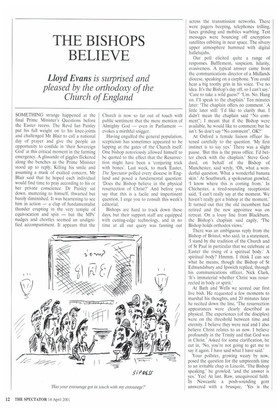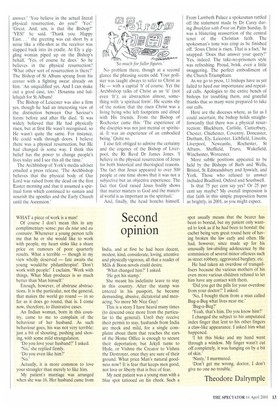THE BISHOPS BELIEVE
Lloyd Evans is surprised and
pleased by the orthodoxy of the Church of England
SOMETHING strange happened at the final Prime Minister's Questions before the Easter recess. The Revd Ian Paisley put his full weight on to his knee-joints and challenged Mr Blair to call a national day of prayer and give the people an opportunity to confide in 'their Sovereign God' at this critical moment in the farming emergency. A glissando of giggles flickered along the benches as the Prime Minister stood up to reply. Killing his smile and assuming a mask of exalted concern, Mr Blair said that he hoped each individual would find time to pray according to his or her private conscience. Dr Paisley sat down, muttering to himself, thwarted but barely diminished. It was heartening to see him in action — a clap of fundamentalist thunder erupting in the very temple of equivocation and spin — but the MPs' nudges and chortles seemed an undignified accompaniment. It appears that the Church is now so far out of touch with public sentiment that the mere mention of Almighty God — even in Parliament — evokes a mirthful snigger.
Having engulfed the general population, scepticism has sometimes appeared to be lapping at the gates of the Church itself. One bishop notoriously allowed himself to be quoted to the effect that the Resurrection might have been a 'conjuring trick with bones'. Last week, to mark Easter, The Spectator polled every diocese in England and posed a fundamental question: 'Does the Bishop believe in the physical resurrection of Christ?' And before you say that this is a facile and impertinent question, I urge you to consult this week's editorial.
Bishops are hard to track down these days, but their support staff are equipped with cutting-edge technology, and in no time at all our query was fanning out across the transmission networks. There were pagers beeping, telephones trilling, faxes grinding and mobiles warbling. Text messages were bouncing off encryption satellites orbiting in near space. The silvery upper atmosphere hummed with digital hallelujahs.
Our poll elicited quite a range of responses. Bafflement, suspicion, hilarity, evasiveness. A typical answer came from the communications director of a Midlands diocese, speaking on a earphone. You could hear a big toothy grin in his voice. 'I've no idea. It's the Bishop's day off, so I can't say.' 'Care to take a wild guess?"Urn. No. Hang on. I'll speak to the chaplain.' Ten minutes later: The chaplain offers no comment.' A little later still: 'I'd like to clarify that. I didn't mean the chaplain said "No comment"; I meant that if the Bishop were available, he would like to comment; but he isn't. So don't say "No comment". OK?'
At Oxford a female liaison officer listened carefully to the question. 'My first instinct is to say yes.' There was a slight pause. 'But this is the press office. I'd better check with the chaplain.' Steve Goddard, on behalf of the Bishop of Manchester, said wryly, 'Oh, what a wonderful question. What a wonderful banana skin.' At Southwark, a spokesman growled, 'I know where this is coming from.' In Chichester, a tired-sounding receptionist said, 'I can't really say at the moment. We haven't really got a bishop at the moment.' It turned out that the old incumbent had retired and the new appointee was on retreat. On a lousy line from Blackburn, the Bishop's chaplain said cagily, 'The Bishop holds orthodox views.'
There was an ambiguous reply from the Bishop of Bristol, who said, in a statement, 'I stand by the tradition of the Church and of St Paul in particular that we celebrate at Easter the rising of a spiritual body.' A spiritual body? Hmmm. I think I can see what he means, though the Bishop of St Edmundsbury and Ipswich replied, through his communications officer, Nick Clark, 'It's immaterial whether Christ was resurrected in body or spirit.'
At Bath and Wells we scored our first live bish. He requested a few moments to marshal his thoughts, and 20 minutes later he recited down the line, 'The resurrection appearances were clearly described as physical. The experiences (of the disciples) were on the threshold between time and eternity. I believe they were real and I also believe Christ relates to us now. I believe profoundly in the Trinity and that God was in Christ.' Asked for some clarification, he cut in, 'No, you're not going to get me to say it again. I have said what I have said.'
Your pollster, growing weary by now, posed the question for the umpteenth time to an irritable chap in Lincoln. 'The Bishop speaking,' he growled, 'and the answer is yes.' Yes! At last. Raw, unequivocal faith. In Newcastle a posh-sounding gent answered with a brusque, 'Yes is the
answer.' 'You believe in the actual literal physical resurrection, do you?' Yes!' 'Great. And, urn, is that the Bishop?' `YES!' he said. `Thank you. Happy East. . . ' the greeting was cut short by a noise like a rifle-shot as the receiver was slapped back into its cradle, At Ely a giggling woman piped up on the Bishop's behalf, `Yes, of course he does.' So he believes in the physical resurrection? 'What other sort of resurrection is there?' The Bishop of St Albans sprang from his corner with a fighting sweat already on him. 'An unqualified yes. And I can make out a good case, too.' Hosanna and hallelujah for St Albans!
The Bishop of Leicester was also a firm yes, though he had an interesting view of the distinction between Our Saviour's forms before and after He died. 'It was widely believed that He had physically risen, but at first He wasn't recognised, so He wasn't quite the same. For instance, He could walk through doors. I believe there was a physical resurrection, but He had changed in some way. I think this belief has the power to change people's lives today and I see this all the time.'
The Archbishop of York's media adviser ernailed a press release. `The Archbishop believes that the physical body of Our Lord was raised from the dead on the first Easter morning and that it assumed a spiritual form which continued to sustain and nourish the apostles and the Early Church until the Ascension.' No problem there, though at a second glance the phrasing seems odd. Your pollster was taught always to refer to Christ as He — with a capital 'h' of course. Yet the Archbishop talks of Christ as an `it' (not even 'IC); an abstraction almost, something with 'a spiritual form'. He seems shy of the notion that the risen Christ was a living being who left footprints and dined with His friends. From the Bishop of Rochester came this: 'The experience of the disciples was not just mental or spiritual. It was an experience of an embodied being.' Quite so.
I also felt obliged to admire the certainty and the cogency of the Bishop of Liverpool. the Rt Revd Dr James Jones. 'I believe in the physical resurrection of Jesus for both historical and theological reasons. The fact that Jesus appeared to over 500 people at one time shows that it was not a subjective but an objective experience. The fact that God raised Jesus bodily shows that matter matters to God and the material world is as important as the spiritual.'
And, finally, the head honcho himself. From Lambeth Palace a spokesman rattled off the statement made by Dr Carey during Breakfast with Frost on Palm Sunday. It was a blistering reassertion of the central tenet of the Christian faith. The spokesman's tone was crisp as he finished off. `Jesus Christ is risen. That is a fact,' he snapped. `Does that answer your query?' Yes, indeed. The take-no-prisoners style was refreshing. Proud, brisk, even a little swaggering. The perfect embodiment of the Church Triumphant.
As we go to press, 11 bishops have as yet failed to heed our importunate and repeated calls. Apologies to the entire bench of bishops for troubling them, and grateful thanks that so many were prepared to take our calls.
Here are the dioceses where, as far as I could ascertain, the bishop holds straightforwardly that there was a physical resurrection: Blackburn, Carlisle, Canterbury, Chester, Chichester, Coventry. Doncaster, Durham, Ely, Leicester, Lichfield, Lincoln, Liverpool, Newcastle, Rochester, St Albans, Sheffield, Truro, Wakefield, Winchester, Worcester.
More subtle positions appeared to be held by the Bishops of Bath and Wells, Bristol, St Edmundsbury and Ipswich, and York. Those who refused to answer included Bradford. Oxford and Southwell.
Is that 75 per cent say yes? Or 25 per cent say maybe? My overall impression is that faith in this simple proposition burns as brightly, in 2001, as you might expect.



























































 Previous page
Previous page